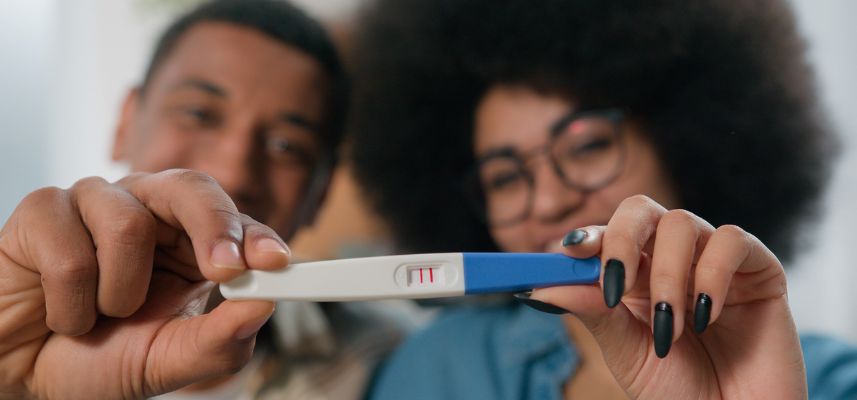Key Takeaways:
-
Most pregnancy tests are 98-99% effective when used correctly
-
If you think you might be pregnant, testing on the first day of your missed period—or about a week after—usually gives the clearest results
-
Morning urine gives the most accurate results because it's more concentrated
-
Follow the instructions on your test kit carefully. Incorrect use can lead to false-positive or false-negative results
Testing for pregnancy can be an emotional experience. A minute might feel like forever when you're waiting for those lines to appear on a stick. If you're trying to conceive, the cycle of hope and disappointment from early testing can be crushing. And if you're worried about an unplanned pregnancy, remember you aren't alone. We're here to support you.
In this guide, we'll help you navigate pregnancy tests, including when to test, how they work, and tips for getting the most accurate results.
IN THIS ARTICLE:
How Early Will Pregnancy Show Up on a Test?
Understanding How Pregnancy Tests Work
What Are the Very Early Signs of Pregnancy?
When Will My Pregnancy Test Be Positive?
The Science Behind False Results
Special Circumstances to Consider
When to See Your Healthcare Provider
How Early Will Pregnancy Show Up on a Test?
Breast milk naturally changes throughout your breastfeeding journey, and each stage has characteristic colors:
So, you missed your period, and now you're at the store, staring at a sea of tests in front of you. But how do you know which one to buy? And, more importantly, how soon can you start testing?
Most home pregnancy tests can detect pregnancy the day after your first missed period. The science behind it is pretty straightforward: your body starts producing the pregnancy hormone human chorionic gonadotropin (hCG) 6-10 days after conception, but those levels start low. It takes time for a test to detect them reliably.. So even if you are pregnant, it might take a few weeks before you get a positive result.


Understanding How Pregnancy Tests Work
Have you ever stared at a pregnancy test and wondered if you're holding it upside-down? You're not alone. Tests vary by brand, so you'll want to read the instructions carefully before interpreting your results.
The most common types of at-home tests you'll find include:
-
Line tests: Two lines = pregnant, one line = not pregnant (or too early to tell)
-
These tests may use blue or pink dye:
-
Blue dye tests appear darker and develop quickly but can sometimes produce evaporation lines, which may be confusing
-
Pink dye tests are less likely to create evaporation lines and are often easier to read, though they may develop slightly slower
-
Digital tests: Spell it out in words: "pregnant" or "not pregnant"
-
Early detection tests: More sensitive, able to detect pregnancy up to 6 days before your missed period
All at-home pregnancy tests detect hCG in your urine, but sensitivity can vary significantly. Many home pregnancy tests detect levels above 25 mIU/mL. You can grab tests at drugstores, supermarkets, big-box stores, and even the dollar store.
So, is 5 Days Too Early to Take a Test?
Testing 5 days before your missed period may be too early for reliable results. For the most accurate reading, it’s best to wait until the day after your missed period, or at least 12-14 days after ovulation. Even those tests promising results "6 days sooner!" aren't magic!
If you choose to test early (before your missed period), here's what you can do to improve your chances of getting the most reliable results:
-
Use the first morning urine (your first pee of the day). This is the time when hCG levels are most concentrated.
-
Choose a sensitive test with a lower hCG threshold (around 10 mIU/mL). These are often marketed as “early detection” tests.
-
Plan to test again. Manage your expectations and know you might test negative even when you think you could be pregnant. If the first test is negative, try again the day after your missed period.
-
Avoid drinking a ton of fluids right before the test. Very diluted urine = lower hCG levels, making it harder to accurately detect pregnancy results.
What Are the Very Early Signs of Pregnancy?
Before a missed period, your body might drop some subtle hints. And you’ve probably heard someone say, “I just knew the moment it happened!” But for most of us, it’s not that clear. Some bodies whisper, others keep secrets until the test spells it out. Either way, both experiences are real and valid.
If you're wondering how you might feel during early pregnancy, it's a little complicated. Pregnancy is typically dated from the first day of your last normal menstrual period (LMP), not from the day of conception. This means that during weeks 1–2 of the pregnancy timeline, you are technically not yet pregnant. But as you approach week four, or 10 to 14 days after ovulation, you might notice:
Cramping that feels different: Not quite period cramps, more like gentle tugging or pulling
Implantation bleeding: Light spotting that stops quickly, then… nothing
Exhaustion or fatigue: You've unlocked a new level of fatigue, and you might even be tempted to fall asleep standing in line at Target
Heightened sense of smell: Suddenly you may notice smells you wouldn’t have noticed before
Heartburn: You don't feel great even though all you ate was toast
Feeling warmer than usual: Your body temperature might be slightly elevated
Sore boobs: You can't figure out why they're feeling more tender than usual
The worst part? A lot of these symptoms mirror PMS perfectly. Liz Truesdale, RN, IBCLC, an expert lactation consultant at Aeroflow Breastpumps, explains, "Many women describe those first few weeks as feeling like their period is about to start any minute—except, of course, it doesn’t. Others feel completely normal and are shocked by a positive test. There's no 'right' way to feel, which is both reassuring and incredibly frustrating when you're symptom-spotting."
When Will My Pregnancy Test Be Positive?
If you've already spent days searching "how soon is too soon to take a pregnancy test" and still aren't sure, don't worry. We've got you covered.
For most people: A home pregnancy test will show positive results around 12-14 days past ovulation (DPO). Basically around the time your period should arrive
The early birds: Might get a faint positive as early as 10 DPO with sensitive tests
Late implanters: Might not get a positive until 14+ DPO
For 10-20% of women, irregular periods can make all this timing guesswork even trickier. However, hCG levels double every 2 to 3 days during early pregnancy. So if you test negative at 10 DPO, you might get a clear positive at 14 DPO. Patience is hard but worth it for accurate results.
The Science Behind False Results
If you’ve ever felt that mix of hope and confusion staring at a pregnancy test, you know how emotional it can be. But before you assume the worst (or best), you should know what might be going on behind the scenes.
False negative results can occur when:
-
Testing too early (most common reason)
-
Urine is too diluted from drinking too much water
-
Not following test instructions
-
Using an expired test
False positives are rare but can happen with:
-
Recent pregnancy loss (chemical pregnancy)
-
Fertility medications containing hCG
-
Certain medical conditions
-
Evaporation lines (those tricky gray/faded lines that may appear after the test window has passed)
Tips for Getting Accurate Results
-
Best bet: After the first day of your missed period (14 DPO)
-
Can't wait? At least 10-12 DPO
-
Most reliable: 21 days after unprotected sex
Read results within your test's specified time window (usually 1-5 minutes).
Money-saving mom tip: Those cheap pregnancy tests from the dollar store work just as well as the $15 ones from the pharmacy! They all detect the same hormone, so save your money for prenatal vitamins (or chocolate, no judgment).


Special Circumstances to Consider
If only our bodies came with a clear “now’s the time to test!” notification, right? Life, hormones, and motherhood love to keep us guessing. Here are a few special situations that can make timing trickier.
Breastfeeding and Pregnancy Tests
Breastfeeding doesn't directly affect pregnancy test results because the hormones involved in milk production don't interfere with hCG. But if you're in those first six months postpartum and exclusively breastfeeding, you might not be ovulating yet. Your cycle could be thrown off, making it difficult to tell when to test. And then there's the fact that the postpartum exhaustion and breast tenderness you're already dealing with are also symptoms of early pregnancy. You might be pregnant but believe your fatigue is simply a normal part of postpartum life.
Fertility Medications
If you’re using fertility medications, some may contain hCG, which can cause a false positive on a home pregnancy test. Always talk with your reproductive endocrinologist about the best timing to test for accurate results. They can guide you based on your specific treatment protocol.
Irregular Cycles
If your menstrual cycle is all over the map, knowing when to test can feel tricky. Your best approach is to test 21 days after unprotected sex. Negative but still no period? Try testing again a week later. Repeat until you get a positive result or your period starts.


When to See Your Healthcare Provider
Once you’ve tested, it’s normal to have a million questions: Do I call my doctor? Should I retest? What happens next? Here's what to do after that little line appears:
-
Confirm with a blood test (measures exact hCG levels)
-
Schedule your first prenatal appointment
-
Start taking prenatal vitamins (if you're not already taking them)
You can also call or schedule an appointment with your healthcare provider if:
-
You get positive then negative results (could be chemical pregnancy)
-
You have severe cramping or bleeding with a positive pregnancy test
-
Your period is very late, but tests are negative
-
You're on fertility medications and need guidance
What Happens After an At-Home Pregnancy Test?
Taking a home pregnancy test is all about timing. Testing too early usually leads to false negatives, wasted money, and unnecessary stress. And while you technically can take a pregnancy test “up to 6 days before your missed period," you'll get the most accurate results by waiting until the day after your missed period or 21 days after unprotected sex. If you test early and get a negative result but still think you're pregnant, wait a few days and test again with first morning urine. And remember, positive or negative, one test result doesn't define your journey.
At Aeroflow Breastpumps, we're here to support you through pregnancy, birth, and beyond. Our team offers resources and educational classes to help navigate every part of this journey, from those first two lines through the fourth trimester. Plus, our classes and lactation consults are covered by most insurances, making support more accessible when you need it most. Complete our eligibility form to discover the resources at your disposal.





